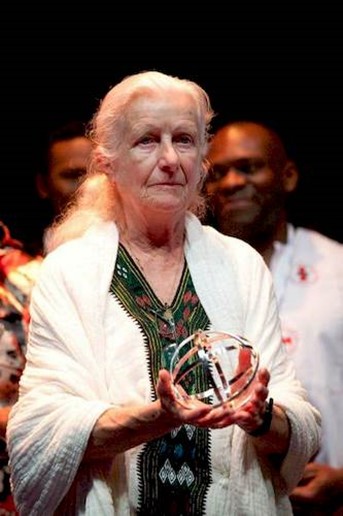 International days of observance are occasions to educate
the general public on issues of concern, to mobilise political will and
resources to address global problems, and to celebrate and reinforce
achievements of humanity. Many days of observance are championed by national,
regional and international organisations such as the UN.
International days of observance are occasions to educate
the general public on issues of concern, to mobilise political will and
resources to address global problems, and to celebrate and reinforce
achievements of humanity. Many days of observance are championed by national,
regional and international organisations such as the UN.
World Environment Day is celebrated on 5th of June every year, not long after Africa Environment Day (3 March) and the UN’s International Women’s Day (8 March). In this context, last year for Africa Environment Day, I discussed Wangari Maathai. This year, I would like to mention another inspiring example to help celebrate all those three days.
Sue Edwards was a prominent British-Ethiopian botanist, environmental and development champion in Ethiopia. She was born on 14 June 1942, to a smallholder farming family in Dartford, Kent. After education in botany and secondary teaching at the Universities of Manchester and Liverpool, she went to Ethiopia in 1968, working at the Institute of Agricultural Research and lecturing at Addis Ababa University for many years. Alongside this she worked extensively in a number of grassroot development projects, which in her later career were based at the Institute for Sustainable Development, where she was a director. In her 50 years of dedicated service to Ethiopia and Eritrea, she had made massive contribution to botany, from field collection of herbaria to editing the 8 volume, 9000 species rich Flora of Ethiopia and Eritrea, a work which took 29 years. But it was not only in botany she excelled. She was an active participant in sustainable agricultural practices and land reclamation in aid of farming communities. In recognition of her contributions, she received a number of national and international accolades, including National Green Awards (2007), Gothenburg Award (2011, shared with former UN Secretary General Kofi Annan) and One World Lifetime Achievement Award (shared with her husband Dr. Tewolde Berhan Gebregziabher, 2017).
Sue passed away in Addis Ababa, on 14 February 2018. An obituary by Gaia Foundation, where she also advised, provides a summary of her contribution as follows: “Over her many years in Ethiopia, Sue accrued an enviable knowledge about the vast wealth of crops, wild foods, nutrition, medicinal plants and biodiversity that is on the verge of being lost in Africa; and she shared her knowledge widely. She was a source of inspiration and information for many in the African Biodiversity Network, which she helped establish.”
She was definitely an inspiration to all and not only to her second home Africa, but also the world.
Sue is survived by her husband, a prominent Ethiopian botanist, and three daughters, one of whom has followed her parents’ profession into a life of plants.
Postscript: At the time of writing (Spring 2022), Ethiopia is tearing itself apart in a tragic and costly civil war, severely impacting many areas where Sue worked, and which has resulted in famine. It is hoped this will end for the sake of the people and environment, which Sue dedicated her life’s work to.
Sue followed Sylvia Pankhurst, the
suffragette and activist, who also made Ethiopia her home and is buried in
Addis Ababa.



Rate and Review
Rate this article
Review this article
Log into OpenLearn to leave reviews and join in the conversation.
Article reviews